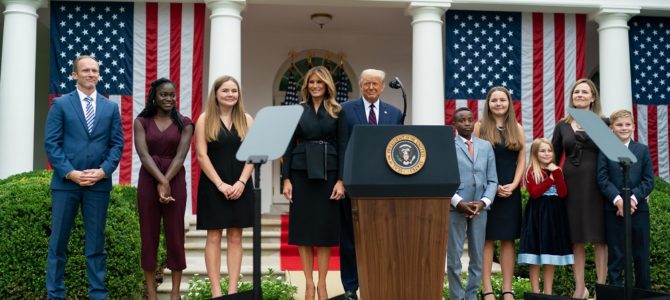
Is the nomination and potential confirmation of Amy Coney Barrett an existential threat to gay rights in America? The fear campaign set off by LGBT media after comments from Justice Clarence Thomas and Justice Samuel Alito regarding the consequences of the Obergefell decision has convinced many this is the case.
On Oct. 5, 2020, the Supreme Court decided not to hear the case brought by Kim Davis, a former Kentucky county clerk, who refused to issue a marriage license to a same-sex couple in 2015. In comments on the case, Justice Thomas argued, “Due to Obergefell, those with sincerely held religious beliefs concerning marriage will find it increasingly difficult to participate in society without running afoul of Obergefell and its effect on other anti-discrimination laws.”
He continued, “It would be one thing if recognition for same-sex marriage had been debated and adopted through the democratic process, with the people deciding not to provide statutory protections for religious liberty under state law. But it is quite another when the court forces that choice upon society through its creation of atextual constitutional rights and its ungenerous interpretation of the Free Exercise Clause, leaving those with religious objections in the lurch.”
In response, multiple LGBT sites declared, as Queerty expressed it in a headline, “Two Supreme Court Justices just said they want to overturn marriage equality.” Former Democratic presidential candidate Pete Buttigieg tweeted, “So much for precedent and judicial restraint. Two justices now openly call for an end to marriage equality—knowing reinforcements are on the way. The stakes could not be higher.”
The Human Rights Campaign echoed the sentiment, tweeting, “The alarming statements from Justices Thomas and Alito regarding marriage equality are a clear sign that LGBTQ rights still hang in the balance with the Supreme Court. Our love is valid, our love is equal and our rights must be. #LoveWins”
Queerty highlighted this quote from the court document signed by both Justice Alito and Justice Thomas: “By choosing to privilege a novel constitutional right over the religious liberty interests explicitly protected in the First Amendment, and by doing so undemocratically, the Court has created a problem that only it can fix. Until then, Obergefell will continue to have “ruinous consequences for religious liberty.” They followed up with, “Did you catch that last part about how same-sex marriage is a problem that only the Supreme Court can fix?”
The hysteria, however, appears to have missed the point. The justices, who dissented in Obergefell v. Hodges on these same grounds, were commenting on the legal consequences such a broad ruling has on issues larger than same-sex marriage. Neither justice commented on the nature of same-sex marriage or its validity, and neither implied it was the cause of religious liberty concerns. Neither came close to even hinting at overturning “marriage equality.”
What they did speak to was the consequences of how LGBT activists have abused the ruling to attack Christians ever since, under the flag of constitutional rights. As the Masterpiece Cakeshop case illustrated, the LGBT left has dedicated its energy and activism towards targeting Christian business owners for harassment and financial ruin in the name of “equality.” Had they not so aggressively threatened religious liberty, this would not have been an issue.
That really is the argument the justices are making here. When they say the court created a problem only it can fix, they are not talking about same-sex marriage. They are referencing the fact that Obergefell ignored its probable effects on religious Americans and their rights, which are being infringed upon, and that is something the court must address under its duty to protect constitutional rights.
This in no way requires overturning Obergefell to accomplish. The hysteria is over nothing.
Obergefell did not make same-sex marriage a constitutional right, it simply stated that states could not restrict marriage based on sex. Bostock v. Clayton County Georgia also argued that sex, as understood in the Civil Rights Act of 1964, includes sexual orientation.
What, however, if Obergefell were to be overturned? Currently, 67 percent of Americans support same-sex marriage, with nearly half of Republicans agreeing. States would once again be free to define marriage based on the will of the voters. Due to legally married same-sex couples living in every state in the nation, as well as fully recognized throughout the federal government, refusing to recognize same-sex marriage or outright banning it would be exceedingly difficult.
This is a situation the LGBT left has placed itself in. Had they continued to fight for same-sex marriage recognition at the state level, they would have had a much stronger foundation to stand on. By forcing the issue through an activist Supreme Court that fabricated a “right” through creative interpretation of the law, they have made themselves vulnerable to new justices recognizing this flaw as unconstitutional.
By giving one branch of government this much power over their lives when it suited them, they risk that power acting against their wishes when it no longer does. Despite the hysteria, there is nothing to substantiate the claim that Obergefell is on the agenda to be overturned, even with Barrett’s potential confirmation. This should be evidenced by the court’s rejection of Davis’s case.









